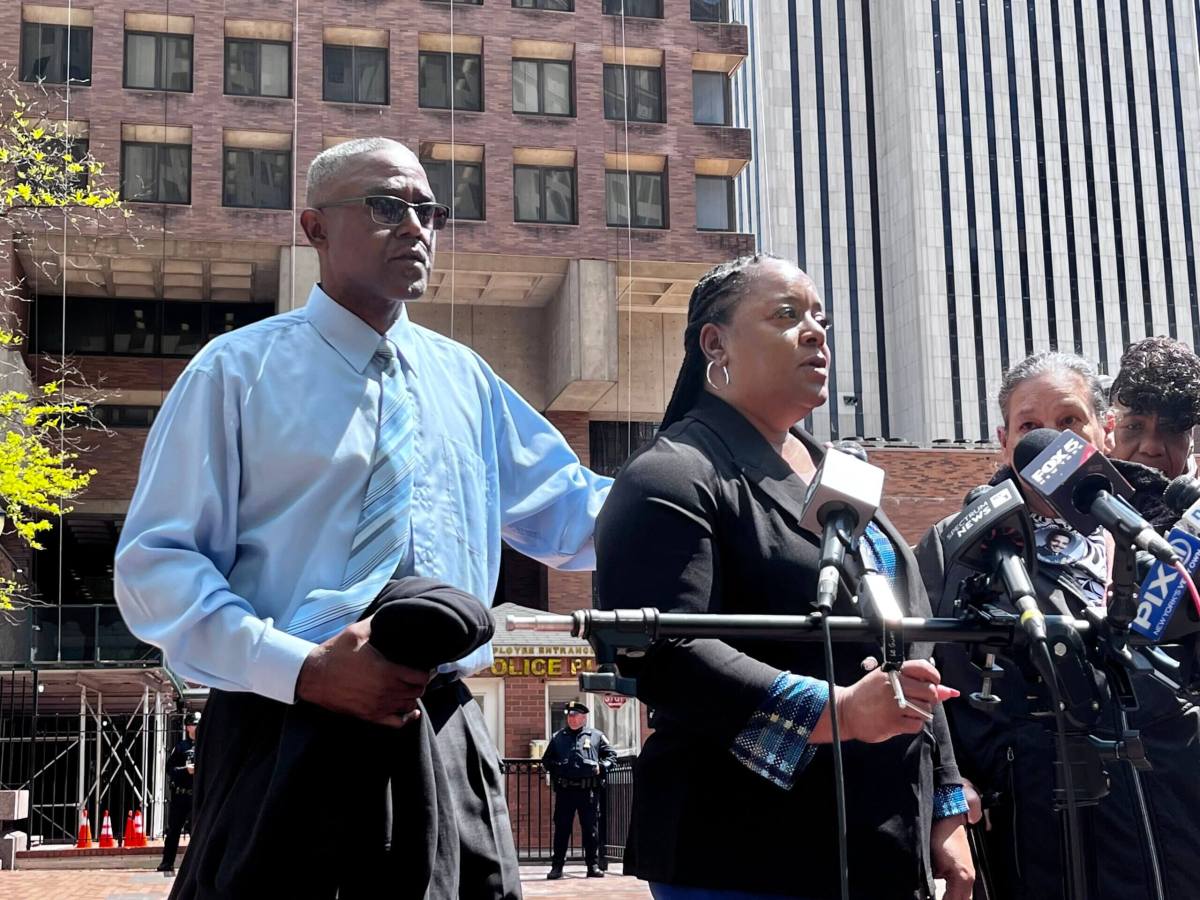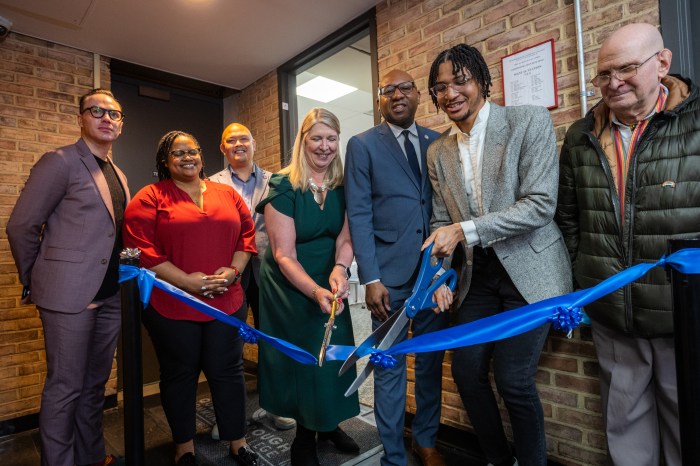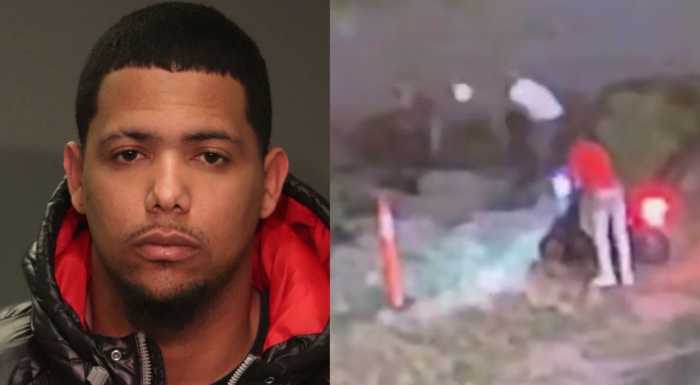Emotions ran high at NYPD headquarters on the first day of a disciplinary trial for the two police officers who were involved in the 2019 shooting death of out gay 32-year-old Kawaski Trawick.
Trawick’s family, flanked by advocates and supporters, watched on during the April 24 NYPD disciplinary trial hearing for Officers Brendan Thompson and Herbert Davis just over four years after Trawick was shot and killed in his apartment at Hill Houses, a supportive living environment at 1616 Grand Avenue in the Bronx.
The trial — which could determine whether the officers keep their jobs — pertains to misconduct charges that were substantiated by the Civilian Complaint Review Board (CCRB), an oversight agency of the NYPD responsible for investigating the police and recommending disciplinary action. The officers are facing discipline for multiple charges, including use of force and failure to render aid, and although a charge for illegally entering Trawick’s apartment appeared to have been dropped in the days leading up to the trial, it re-emerged during the hearing and advocates said all the charges will be heard. The family expressed concern, however, that the charge will ultimately be tossed.
The trial follows four years of investigations, reports, body camera footage revelations, and other developments stemming from the April 2019 killing. In 2020, Bronx District Attorney Darcel Clark said the officers would not face criminal charges, and in 2022, the NYPD told ProPublica that the cops were not punished because “no wrongdoing was found.” Last November, however, it was revealed that the officers would face a disciplinary trial.
On the night he was killed, Trawick called 911 because he locked himself out of his apartment and said there was a fire. Fire Department responders never found a fire, but the building’s superintendent and a security guard had also called police that night and said Trawick was annoying his neighbors.
After the officers arrived, they entered Trawick’s home without his permission while he was cooking and holding a serrated knife. They kept directing him to drop the knife, but he asked them why they were in his home. Trawick went to turn off a radio and again questioned the officers about why they were suddenly in his home.
Officer Thompson proceeded to tase Trawick and then holstered his gun and walked into the apartment. Trawick stood up and screamed — and at that point Thompson had already thrown his taser away, so he instead grabbed his gun and shot Trawick four times. One of the shots hit Trawick in the heart, according to a report published by Clark. Trawick’s body laid on the ground for minutes before he received medical assistance, and police officers were later heard describing him as “just a perp.”
During the April 24 hearing, which featured recordings from the incident and other pieces of evidence, attorneys representing the officers sought to downplay the turn of events at Trawick’s home. Attorney Royce Russell, who represents Trawick’s family, made the case to reporters after the hearing that the officers had no reason to escalate the situation.
The first day of the hearing started at around 10 a.m. and adjourned at midday.
Following the hearing, Trawick’s family emerged from NYPD headquarters to a crowd of advocates holding signs and shouting chants such as “Kawaski Trawick was not a threat” and “fire Thompson and Davis for Kawaski.”
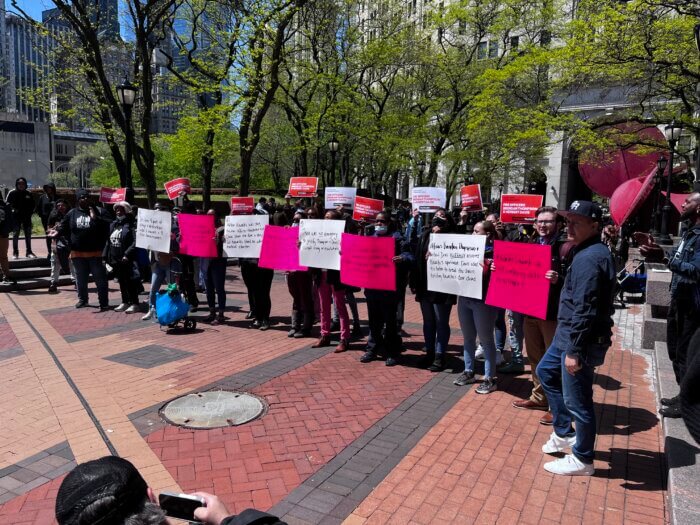
“Kawaski should be still here today with his family, but because Brendan Thompson and Herbert Davis illegally entered his home and took his knife, he’s not here,” said Trawick’s mother, Ellen Trawick, who was being consoled by Trawick’s father, Rickie Trawick, at a post-hearing press conference.
Rickie Trawick subsequently stepped forward and recalled his son as a “good kid” who would not bother anyone, let alone commit a crime.
“Why those police officers went to his home and took his life like that — I don’t understand it,” he said. “I saw those two officers enter my son’s home, shot my son dead — murdered my son — they need to be arrested. They need to be held accountable.”
Ellen and Rickie Trawick have repeatedly traveled to New York from their home in Georgia to follow the developments in the case, meet with officials, and bring attention to their son’s death.
Among the advocates in attendance to support the family included Iris Baez, whose son, Anthony Baez, died at the hands of police in 1994, and Gwen Carr, the mother of the late Eric Garner, who was killed by NYPD officer Daniel Pantaleo in a high-profile 2014 case that drew widespread attention. Councilmember Pierina Sanchez of the Bronx spoke briefly and out queer Councilmember Tiffany Cabán of Queens joined the press conference in solidarity.
“This was a senseless killing,” Carr said as she stood next to Trawick’s family. “There has to be accountability for this. We cannot let this go without accountability. The police officers — they think this was not a crime, that they did what they had to do. I don’t think so.”
She added: “Even when my son was killed, I had to fight for six years to get one officer fired. But we must fight. We must not give up this fight because we cannot deal with these senseless killings. Each time I come back here, there’s another killing. Let’s not let Mr. Trawick’s death go in vain.”
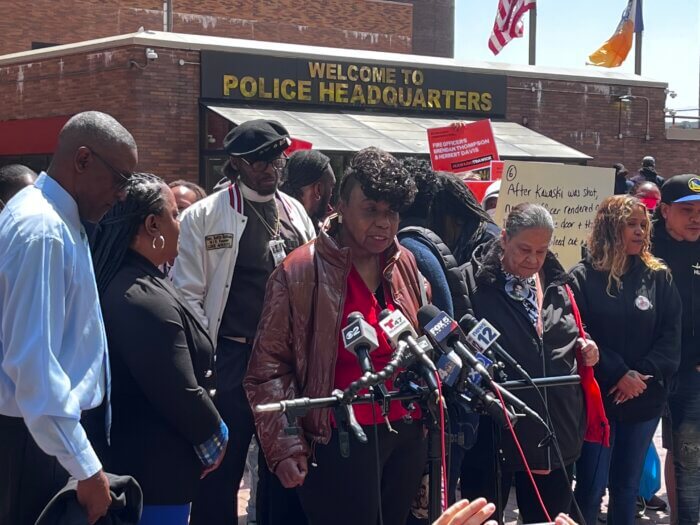
In a separate written statement after the hearing, Ellen Trawick expressed concern that the judge in the trial “is acting like she’s a lawyer for the police who murdered my son — she basically said she was going to recommend the illegal entry charge be dismissed even before any evidence was introduced in the trial today.”
The deputy commissioner of trials, Rosemarie Maldonado, is tasked with conducting impartial disciplinary trials, issuing reports, and providing recommendations to the police commissioner. The trial resumes on April 25.

